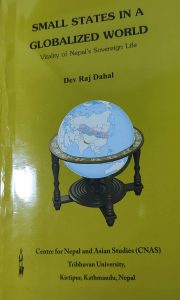Dev Raj Dahal
Senior Political Scientist, Nepal

China is proactive in its initiatives and strategy and stresses on a wider level of cooperation under Belt and Road Initiative ( BRI) signed in May 2017 and trans Himalayan Multi-Dimensional Connectivity Network through rail, tunnel, opening more routes to the north and upgrading the existing ones. The ties are enriched by cooperation in educational, health, economic, ecological and security areas. The implementation of BRI, infrastructure, energy and trade and transit projects and economic corridors helps Nepal to transform from what Xi Jinping said “land locked to the land-linked nation” and unfolds reasonable development opportunities enabling it to play constructive regional and global roles.
He has underlined several vital factors of mutual interests “more exchange and experience sharing on governance and development to deliver greater benefits to the peoples,” strengthening Nepali state’s capacity and will to carry on law enforcement,” “broader defense contacts for common Himalayan security” to fight subversive internal and external elements and ensure the safety of peoples and trade” by extending cooperation on matters of training, equipment and technologies (Subedi, 2018).
The new geopolitical analysis based on technology, transportation and communication advancement “is anti-determinist and replaced ideology-centric one with possibilism” (Starr, 2017:5). This has opened Nepal to enter into a comprehensive strategic partnership with China, explore the new structure of opportunities and change the perception of foreign policy elites. The Indian strategic elites, however, have not taken China’s strategic rise comfortably owing to bitter historical memories and their aspiration of making India a powerful actor in the neighborhood and beyond through the expansion of connectivity, regional economic integration and coalition with Japan, Vietnam, the EU, Australia, Israel and U.S. as leverage to diminish China’s growing heft in Southern Asia. China is suspicious of India joining QUAD, Indo-Pacific Strategy, strategic partnership with the US and intensifying security and economic cooperation with the Western powers against its rising clout in the Himalayas, the South China Sea, the Indian Ocean and resource rich Persian Gulf states. Nepal as a small state needs to reckon with Xi’s geopolitical call for “Asian people to run the affairs of Asia,” akin to the Japanese principal slogan of “Asia for the Asians” in the 1930s and the Indian position to solve “Asian problems without Western involvement” (Scalapino, 1972: 36) until 1970s and become wary of the nation turning into a hub for spies of great powers.
Nepal followed the pattern of other small states—Finland, Austria, Sweden and Switzerland, effectively maintained neutrality in the Sino Indian war of 1962 and the 70-day Doklam standoff in 2017 where the Indian and the Chinese armies were placed face to face along the border of Bhutan, China and India and manifested in Laddakh scuffle between their armies. Their disengagement from the Doklam standoff just on the eve of the Brazil, Russia, India, China and South Africa (BRICS) summit in Beijing, considered a counterweight to the West, offered a sense of relief to Nepal. China discontinued the construction of roads and India withdrew its army.
Nepali leaders have to ponder on this question and struggle hard to overcome the nation’s ‘inferiority complex’ of passive neutrality or suffocating helplessness by properly analyzing the new geopolitical trends, strutting the nation in the world stage and augmenting its leverage, relevance and constructive engagement with the neighbors to avoid such eventuality. It can also suggest the neighbors resolve conflict by reason, not coercion and seek to moderate offensive policies directed against each other.
The Chinese leaders have, however, advised India not to be wary of its infrastructure development role in Nepal, membership in the BRI, strategic partnership and help to the Nepali aspiration for an independent economy. The conflicting pulls explain the strategic dimension of geopolitics. The new geopolitics of possibilism has replaced determinist and ideological clutch (Starr, 2013: 155). Nepali leadership across the party lines needs to acquire the greater capacity for self-critical thinking and understand the ideals of public reason, the dream of a universal vision of progress and a clear destination of the nation. Only an enlightened leadership and interacting public sphere can mediate national issues, communicate the imperative of reconciliation and reconstruction, build its capacity to understand the geopolitical implications of the unfolding reversal of regional and international environment and acquire institutional and diplomatic means for safe and sound adaptation.
The Anglo-Indian geostrategic doctrine of anti-communism, common law, Macaulay’s education and special relationship with Nepal underwent transformation as India abandoned its two-pillar theory of constitutional monarchy and multi-party democracy in Nepal, facilitated 12-point agreement between seven parliamentary parties and rebel Maoists and supported their agitation against the monarchy. The success of the agitation catapulted them into power and elected Constituent Assembly. The Indian advice and then subsequent blockade to prevent the promulgation of the Constitution of Nepal without incorporating Madhesi demands, however, remained unproductive.
The Indian blockade against the Nepali Congress (NC) government led by Sushil Koirala had weakened the NC and alienated the Communist Party of Nepal-Unified Marxist Leninist without winning any Maoist support which had a tendency to fix self in the ideological middle.
The surge of nationalist sentiment evoked by CPN-UML leaders helped it to emerge as a dominant party and form its government with Maoist-Center. For almost three years both the parties had merged into the Communist Party of Nepal (CPN) but they offered opposing foreign policy visions manifested in the cases of the Venezuelan crisis and the MCC. The then government led by K. P. Oli, NC, RPP and the Madhes-based parties exerted pressure for the endorsement of MCC while leaders of the Maoist-Center, RPP and CPN (Unified Socialist) are seeking to modify certain points that belittle Nepal’s sovereignty. The split of CPN into CPN-UML and Maoist-Center and dissolution of the parliament twice by then Prime Minister K. P. Oli for a new election provoked a legal battle in the Supreme Court. The Court restored the parliament and eased the formation of a coalition government of NC, Maoist-Centre, Janata Samajbadi Dal, Rastriya Janamorcha and CPN (Unified Socialist) under NC President Sher Bahadur Deuba as Prime Minister. NC leaders from B. P. Koirala and Sushil Koirala camps hardly think about India a benign democratic emancipator.
The national consensus is resonant in Nepal over its claim on Lipulekh pass, a territory in the tri-junction of Nepal, India and China where the latter two had signed an accord in 2015 to expand trade without consulting the former. India has occupied 35 sq kilometers of Nepali territory in Kalapani, stationed its army since 1961 and constructed a road leading to Kailash Manasarovar that passes through Kalapani, Limpiyadhura and Lipulek pass without consulting Nepal.
On July 7, 2021, Zhao Lijian, spokesperson for the Chinese Foreign Ministry said, “The issue of Kalapani is between Nepal and India. We hope the two countries will resolve their differences properly through friendly consultations and refrain from taking any unilateral action that may complicate the situation.”
Nepal’s claim based on historical proof, however, prompted the Indian foreign policy elites and Army Chief to incorrectly misperceive that these steps are incited by China. Earlier in 2015, the Indian representative said in Geneva that Nepal should “ensure the effective functioning of the Truth and Reconciliation Commission and full implementation of its recommendations, including prosecution of those responsible for violent insurgency.” The Indian critical position on Nepal’s human rights and transitional justice and its refusal to accept Eminent Persons Group’s (EPG) report that suggested measures to update Nepal-India relations added extra flaws to the unique ties. Through the EPG report, Nepal seeks to amend some provisions of the Peace and Friendship Treaty related to national treatment to each other’s citizens in matters of residence, ownership of property, participation in trade and commerce and movement and import of security commodities essential for national defense. It has suggested the regulation of open borders, address the huge trade imbalance, proper utilization of water resources and any other items that restrict its freedom of maneuver. Amicable resolution of these issues demands mending efforts through diplomatic dialogue (Bhattarai, 2021:4, Bhattarai, 2018) beyond repulsive media bluster and political posturing to whip up xenophobic nationalism.
The new geopolitics is informing a new foreign policy debate about Nepal’s ability to promote national interests in competitive rules of globalization affirming the Westphalian sovereignty to acquire equal status, with no right of outsiders to interfere in its internal affairs and manage the surge of the nation’s cultural, social and ethnic assertiveness and attractiveness of universal values. Nepali leaders need to rethink the concept of security in the neighborhood without dubbing any neighbor an enemy and construct a culture that finds common resonance in a policy of multi-polar balancing. It does not spell a negative tone like equal distance or special relationship.
Self-distancing is not possible without a strong self sufficient state and capable enough of subduing internal chaos and steering the society along the vision of the Constitution of Nepal. Ironically, many of Nepal’s state-bearing institutions are enfeebled by partisan political culture lacking a broad national perspective. Mobilization of centripetal forces of society is necessary for national unity and state effectiveness in foreign policy abroad. Diversification of the sources of foreign aid, trade, investment and pro-active role in international forums and organizations can provide Nepal considerable latitude and choice, reduce the burden of dependence, jolt the economy out of stagnation and contribute to national energies for self-development. It helps overcome the danger of peripheralization and corresponding structural dependencies due to external dependence and international competence gap” (Ashoff, 1988: 137).

Nepali scholars harbor no illusion that certain tangible elements shape its foreign policy, no matter which kind of regime remains in power in the capital city, Kathmandu, the political heartland of the nation where major foreign policy decisions are made. Nepal’s traditionally-defined foreign policy choices such as isolation, special relationship, neutrality, equidistance, non-alignment etc. require a new narrative focusing on its limitations and capabilities to seize new opportunities provided by the changing international environment (Khatri, 2016:6). The failure of national parties to satisfy the desire for national self-esteem has incubated the politics of multi-culturalism and multi-national state in Nepal. The proponents of both seek to deconstruct Nepali identity aiming to relativize the fabric of the civic state. These processes are enmeshed with geopolitical drivers of conflict where intelligence agencies of many powerful states are indulged in the micromanagement of Nepal’s internal affairs (Dixit, 2017). To prevent foreign intelligence to become a single tool to navigate violating the nation’s privacy, subverting security and infringing upon citizens’ rights to be free of unreasonable suspicion and observation (Schneier, 2015:257) the nation must make a serious effort to reexamine foreign policy-security nexus beyond party politics. It should be based on a national perspective that has the ownership of all the stakeholders (Khatri, 2012: 11). Nepal’s historically evolved Weltanschauung (worldview) can be a useful guide for leaders because it is refined by experience. Active foreign policy is directly proportional to the nation’s power to defy undue external pressure and become self-reliant and judicious (Dahal, 1990:215) on critical national, regional and global issues.
End text.
# Text courtesy: Excerpts from the recently published book, (2022) “Small States in a Globalised World”, by Centre for nepal And Asian Studies ( CNAS), Tribhuvan University, Kirtipur, Kathmandu, Nepal.
# the entire editorial board of the telegraphnepal.com is highly indebted to the senior political scientist of Nepal, Professor Dev Raj Dahal and the Executive Director of the CNAS Dr. Mrigendra Bahadur Karki.
# published in the larger interest of the global audience: Chief Ed. Upadhyaya N. P.
